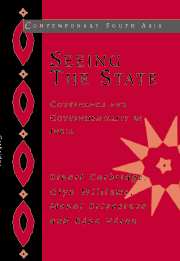Book contents
- Frontmatter
- Contents
- List of boxes, figures and tables
- Acknowledgements
- Glossary
- List of abbreviations
- Introduction
- Part I The state and the poor
- Part II The everyday state and society
- Part III The poor and the state
- Appendix 1 Major national programmes and policies related to poverty alleviation, 1999
- Appendix 2 The 1999 general election in Hajipur
- References
- Index
Introduction
Published online by Cambridge University Press: 22 September 2009
- Frontmatter
- Contents
- List of boxes, figures and tables
- Acknowledgements
- Glossary
- List of abbreviations
- Introduction
- Part I The state and the poor
- Part II The everyday state and society
- Part III The poor and the state
- Appendix 1 Major national programmes and policies related to poverty alleviation, 1999
- Appendix 2 The 1999 general election in Hajipur
- References
- Index
Summary
In recent years there has been a sea-change in the ways in which the state in India has sought to present itself to its poorest citizens. To listen to leading members of the National Democratic Alliance (NDA) government in 2004 one would think that the year 2000 (or even 2001 or 2002) was something like Ground Zero in this respect. Ministers from leading human development departments were in the habit of swatting away criticism of their ministries on the ground that everything was in flux. In a world of village education committees, citizen scorecards and newly vibrant panchayati raj institutions, not to mention a new era of public–private partnerships, it apparently made no sense to criticize ministers for faults that may or may not have dogged previous administrations.
This was nonsense, of course, for many of the innovations that were being trumpeted by the NDA were first given shape by the Congress and United Front governments of the 1990s, when village education committees and joint forest management were launched with appropriate pomp and fanfare. It would also be unwise to assume that new rhetoric about a kinder and more responsive system of government must correspond in any clear way to the perceptions of poorer or more vulnerable people. All democratic governments are tempted by the fruit of exaggeration, and Partha Chatterjee is right to insist that poorer people in ‘most of the world’ (2004: 3) are very often compelled to meet the state as members of social groups ‘that transgress the strict lines of legality in struggling to live and work’ (Chatterjee 2004: 40).
- Type
- Chapter
- Information
- Seeing the StateGovernance and Governmentality in India, pp. 1 - 12Publisher: Cambridge University PressPrint publication year: 2005



